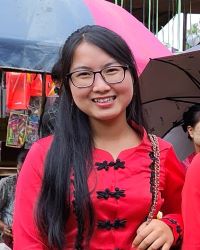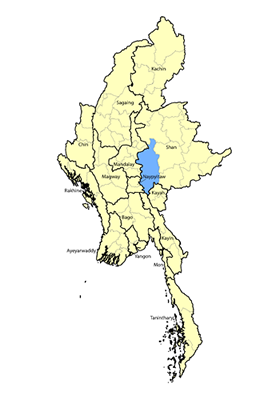Although more than a century ago they were unflatteringly described as “nothing more or less than Burmese-Shan half-breeds," the Danu have long been considered one of Myanmar's official ethnicities. The Danu numbered 63,549 people at the time of the 1901 census, but over the next three decades to 1931 they only increased by 14,000 to 77,941. Their population had risen slowly compared to other groups due to so many men serving as Buddhist monks rather than starting families.
Location: Approximately 116,000 Danu people live in the southern part of Shan State in northern Myanmar. They inhabit Pindaya and Ywangan townships in the Danu Self-Administered Zone and several townships in Taunggyi District. A small number of Danu spill over into Loikaw District in northern Kayah State. Pindaya, the main center of the Danu, is home to famous limestone caves that overlook the picturesque Boutaloke Lake. Inside the cavern “are more than 8,000 Buddha images made from alabaster, teak, marble, brick, lacquer and cement, which have been put there over the centuries and arranged in such a way as to form a labyrinth throughout the various cave chambers.
Language: Danu is a Tibeto-Burman language so closely related to Burmese that scholars consider it a dialect of the national language. There is some dialect variation among the Danu villages, but the differences are not significant. The Danu language is not written, but most people are able to read Burmese.
The name Danu is derived from the Pali term dhanu, meaning “archer” or “bow.” One account says: “In the 16th century the Danu were King Alaungpaya's archers who on returning from wars in Thailand settled in the Pindaya area.” Oral traditions stemming from the same period trace the ancestry of the Danu to intermarriage between Burmese men and Shan women as the Burmese took over new regions and assimilated existing ethnicities.
Some Danu men are employed in the logging industry, but most earn their livelihood by fishing and by cultivating cotton, rice, coffee, and other key crops. They often trade fish and cotton for items such as cell phones and electrical appliances. The Danu have their own traditional style of music, which employs gongs and ancient ozi-long-stemmed goblet drums carved from a single piece of wood and fitted with a deerskin head.
Although almost all Danu people today profess to be Theravada Buddhists, many occult practices exist in their belief system. Some Buddhist monks have taken on the role that shamans formerly had in the community by acting as mediators to the supernatural world. Danu families consider it a great honor when a son serves as a monk in one of the many monasteries in the region. Christians have generally found the Danu very resistant to their message, as they place high value in their cultural cohesion and believe that if they became Christians they would lose that unity and upset their protective spirits.
The Seed Company, a Christian translation ministry, is currently working on producing Scripture in the Danu language, and a great need exists for video and audio resources in the Danu spoken language. Christians constitute a tiny fraction of their population, and believers are often placed under strong pressure to recant their faith. Evangelists from other tribes have traveled to the Danu and shared the Gospel with them. In 2000, New Zealand-based Mission Outreach shared how “a 23-year-old Lahu pastor reached 50 or more Danu families in a neighboring village. One of the Danu converts confessed: ‘I habitually drank alcohol and chewed betel nut. When I heard about Jesus, I realized how dirty and sinful I was. I was so happy when I learned that Jesus could forgive my sins and make me clean. Now I have the assurance that God will not leave me even when I face difficulties. Before God and man, I declare that I have given my life to Jesus!'”
Scripture Prayers for the Danu in Myanmar (Burma).
| Profile Source: Asia Harvest Copyrighted © Used with permission |











